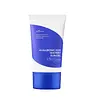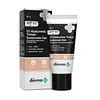What's inside
What's inside
 Key Ingredients
Key Ingredients

 Benefits
Benefits

 Concerns
Concerns

 Ingredients Side-by-side
Ingredients Side-by-side

Water
Skin ConditioningButylene Glycol
HumectantEthylhexyl Salicylate
UV AbsorberHomosalate
Skin ConditioningDibutyl Adipate
EmollientNiacinamide
SmoothingBis-Ethylhexyloxyphenol Methoxyphenyl Triazine
Skin ConditioningCyclopentasiloxane
EmollientMethylene Bis-Benzotriazolyl Tetramethylbutylphenol
UV FilterPolysilicone-15
UV FilterDiethylamino Hydroxybenzoyl Hexyl Benzoate
UV Filter1,2-Hexanediol
Skin ConditioningPentylene Glycol
Skin ConditioningPinus Pinaster Bark Extract
AntioxidantCeramide NP
Skin ConditioningCentella Asiatica Extract
CleansingGlycerin
HumectantPortulaca Oleracea Extract
Skin ConditioningHouttuynia Cordata Extract
Skin ConditioningOlea Europaea Fruit Oil
MaskingFicus Carica Fruit Extract
HumectantSodium Hyaluronate
HumectantCeteth-10
EmulsifyingHydrogenated Lecithin
EmulsifyingDecyl Glucoside
CleansingPropanediol
SolventTocopherol
AntioxidantAstaxanthin
Skin ConditioningHyaluronic Acid
HumectantSodium Hyaluronate Crosspolymer
HumectantAscorbyl Propyl Hyaluronate
Skin ConditioningHydrolyzed Hyaluronic Acid
HumectantHydroxypropyltrimonium Hyaluronate
Acrylates/C10-30 Alkyl Acrylate Crosspolymer
Emulsion StabilisingSodium Acetylated Hyaluronate
HumectantHydrolyzed Sodium Hyaluronate
Skin ConditioningAdenosine
Skin ConditioningXanthan Gum
EmulsifyingCetyl PEG/PPG-10/1 Dimethicone
EmulsifyingTromethamine
BufferingCarbomer
Emulsion StabilisingPropylene Glycol
HumectantEthylhexylglycerin
Skin ConditioningWater, Butylene Glycol, Ethylhexyl Salicylate, Homosalate, Dibutyl Adipate, Niacinamide, Bis-Ethylhexyloxyphenol Methoxyphenyl Triazine, Cyclopentasiloxane, Methylene Bis-Benzotriazolyl Tetramethylbutylphenol, Polysilicone-15, Diethylamino Hydroxybenzoyl Hexyl Benzoate, 1,2-Hexanediol, Pentylene Glycol, Pinus Pinaster Bark Extract, Ceramide NP, Centella Asiatica Extract, Glycerin, Portulaca Oleracea Extract, Houttuynia Cordata Extract, Olea Europaea Fruit Oil, Ficus Carica Fruit Extract, Sodium Hyaluronate, Ceteth-10, Hydrogenated Lecithin, Decyl Glucoside, Propanediol, Tocopherol, Astaxanthin, Hyaluronic Acid, Sodium Hyaluronate Crosspolymer, Ascorbyl Propyl Hyaluronate, Hydrolyzed Hyaluronic Acid, Hydroxypropyltrimonium Hyaluronate, Acrylates/C10-30 Alkyl Acrylate Crosspolymer, Sodium Acetylated Hyaluronate, Hydrolyzed Sodium Hyaluronate, Adenosine, Xanthan Gum, Cetyl PEG/PPG-10/1 Dimethicone, Tromethamine, Carbomer, Propylene Glycol, Ethylhexylglycerin
 Reviews
Reviews

Ingredients Explained
These ingredients are found in both products.
Ingredients higher up in an ingredient list are typically present in a larger amount.
Cyclopentasiloxane, or D5, is a silicone used to improve texture of products and trap moisture.
D5 is considered lightweight and volatile. Volatile means it evaporates quickly after application. Once evaporated, D5 leaves a thin barrier that helps keep skin hydrated.
It is also an emollient. Emollients help soften the skin and prevent water loss. Silicones create a silky texture in products. D5 helps other ingredients become more spreadable.
Studies show D5 is safe to use in skincare products. We recommend speaking with a skincare professional if you have concerns.
Learn more about CyclopentasiloxaneHyaluronic acid is naturally found in healthy skin. It is a humectant, meaning it draws moisture to your skin.
This ingredient helps hydrate, soothe, and protect the skin.
What makes hyaluronic acid so hydrating? It has the capacity to bind or hold large amounts of water.
Fun fact: It is already naturally found in our bodies, such as the fluids of our eyes and our joints.
Studies find this ingredient to have anti-inflammatory and anti-microbial properties. This can help speed up wound-healing.
Hyaluronic acid can be irritating if the molecule has a low-molecular weight, or if the molecules are small.
One study found low-molecular weight hyaluronic acid to be pro-inflammatory, meaning some people may experience irritation. This is because our bodies use hyaluronic acid in the wound-healing process to signal to our bodies, via irritation, that something needs healing.
The same study found high-molecular weight hyaluronic acid to be anti-inflammatory.
These are some other common types of Hyaluronic Acid:
Learn more about Hyaluronic Acid